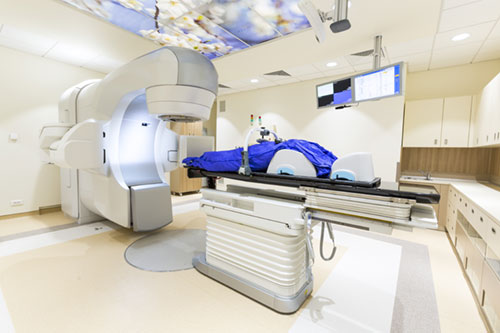Introduction
Cancer is managed by a multidisciplinary team consisting of surgical, medical and radiation oncologists along with specialised nurses, nutritionists, occupational therapists, psychologists, social workers and expert technical staff whose cooperation ensures excellent treatment delivery and patient care. Radiation oncology is a branch of modern medicine which treats cancer using high intensity x-ray and particle beams. Rarely, radiation beams are used in non-malignant conditions also.

Are the Cancer Cases Rising in India?
As per an ICMR study, one in nine Indians develop cancer in their lifetime. Lung and breast cancers are the most common cancers in men and women respectively. One in 68 men will develop lung cancer and one in 29 women will develop breast cancer. Even though tobacco-related cancers and cervical cancers are declining in India, breast cancer is on the rise, especially in the urban areas. There is an increase in lung cancer cases too. Apart from smoking, environmental pollution also plays a role. Other factors that contribute to an increase in cancer cases in India are alcohol consumption, tobacco use, a sedentary lifestyle and being overweight. It is highly promising that the cure rates for various cancers are much higher now, thanks to general awareness and screening programmes and better accessibility to cancer treatments. Yet, there is much scope for improvement in cancer management which includes preventive strategies, imaging, surgery, chemotherapy, radiotherapy and palliative care.
Radiation Oncology – A Specialized Tool Against Cancer
Radiation therapy is one among the major pillars used in the fight against cancer. Radiation can be delivered externally through a linear accelerator machine or internally via radioactive sources placed inside the body. Modern high precision radiotherapy techniques like intensity modulated radiotherapy (IMRT), volumetric modulated arc therapy (VMAT) and stereotactic body radiotherapy involve multiple photon beams designed according to the shape and size of the tumour. There is a high dose of radiation falling on the tumour while sparing the surrounding normal tissues. Hence, patients treated with modern techniques face few side-effects which are mostly transient. Radiation therapy can be delivered in a single fraction, three to five fractions or three to six weeks depending on the clinical indications. Most of the cancer patients receive radiotherapy as a part of their treatment course.
Radiation oncology team consists of radiation oncologists, medical physicists, radiation safety officers, radiotherapy technologists, nursing staff and other supportive personnel. A well-co-ordinated team work is essential for ensuring quality treatment and the best outcome. Radiotherapy treatment course consists of the following:
Consultation
The patient meets a radiation oncologist who clinically examines the patient and reviews imaging and biopsy reports. Radiation treatment is customized according to the diagnosis and after considering multiple factors. Once it is decided that the patient needs to undergo radiotherapy, he/she is sent for simulation procedure.
Simulation
Radiotherapy technologist places the patient in the treatment position and immobilization is done using customized thermoplastic masks or vaclock bags. This maintains the exact position everyday of treatment. Patient undergoes a simulation CT scan with or without contrast. The images are transferred to the treatment planning system.
Treatment Planning
The oncologist, medical physicist and dosimetrist are involved in this step. Radiation oncologist contours the target areas and normal areas in the images co-registered in the system. Diagnostic images taken prior like MRI or PET CT are also fused with the simulation CT images, which give a better idea of the areas of tumour. Medical physicist designs radiotherapy fields with the use of planning software. It is designed in such a way that the tumour area gets the maximum dose and normal tissues less dose, within their tolerance limit. They derive multiple plans and the oncologist patiently reviews each plan, so that the best plan is selected for the treatment. Modifications are done if indicated. The entire process takes two to three days.
Quality Assurance
Physicists and dosimetrists run multiple tests to confirm that the linear accelerator can safely deliver the plan. Each plan needs to undergo QA tests before treatment starts.
Treatment Delivery
On the day of treatment, the patient will be immobilized in the position of simulation and cone beam CT images will be taken. The images are fused with the planning CT and necessary adjustments are done in the presence of an oncologist and physicist. Such treatment verification images are taken daily or a few times a week depending on the technique used. Patients receive treatment daily, five days per week. It takes about 5 minutes for the actual delivery of radiation treatment, but with positioning and set-up it can take up to 15-20 minutes. Every day, the patient has to spend about an hour in the department. The oncologist reviews the treatment delivery offline daily and gives suggestions to the radiotherapist/radiotherapy technologist. Patients are reviewed by the concerned consultant on a weekly basis to assess the general condition, progress and side-effects. Radiotherapy plans may need modifications in some cases if the patient loses weight or due to tumour shrinkage.
Follow-Up
Doctor sees the patient at the end of the radiotherapy course to assess him/her and provides supportive medications. Later, after one month, the patient needs to come to the clinic for follow-up and after that follow-up will be done every three months for two years. Review scans are taken during this period. Once everything is normal, patient is kept on regular follow-up every six months for up to five years.
Conclusion
Radiotherapy is a complex process that uses many principles which work together. A great team working in harmony can offer the patient a safe and effective treatment course.

